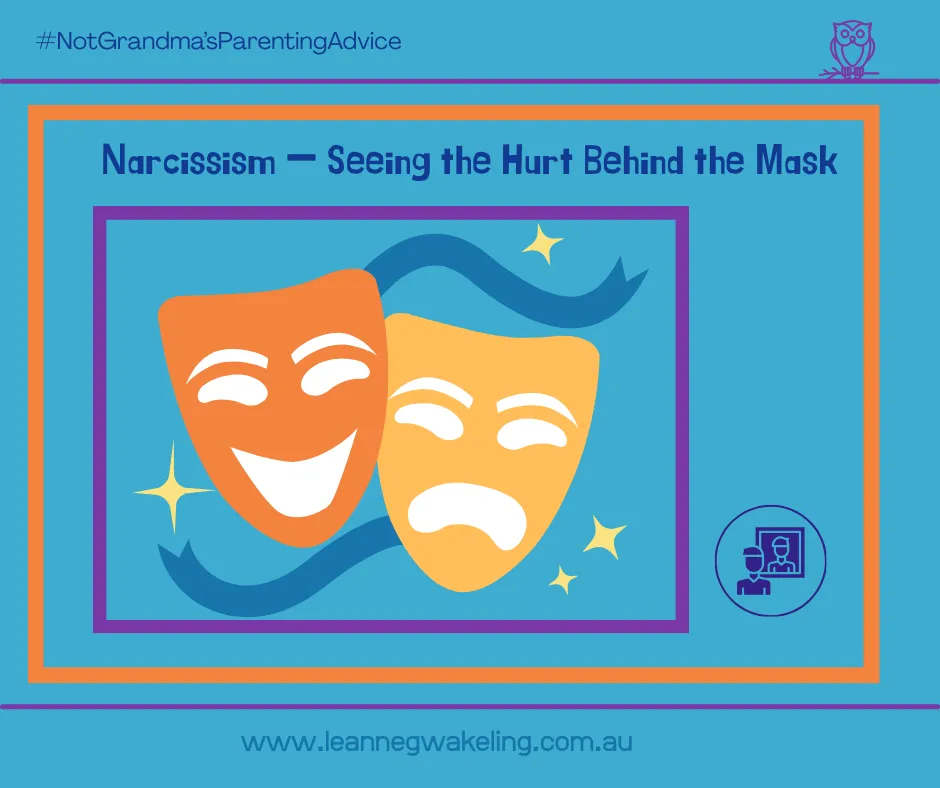
Narcissism - Seeing the hurt behind the mask
“Narcissism is the adult who is still developmentally a hurt, shame-filled child.” - Dr. Nicole LePera (The Holistic Psychologist

Narcissism — Seeing the Hurt Behind the Mask
Narcissism is a word that stirs up strong reactions — and often carries meanings that are only partly understood or, sometimes, misunderstood altogether.
In today’s world, it’s an especially charged topic. Many people are navigating recovery from controlling or emotionally limited upbringings, while others have developed narcissistic traits as a means of emotional survival.
It’s easy to fall into the “finger-pointing” trap:
You’re terrible. I’m better than that.
But here’s the truth — when we shame someone with narcissistic tendencies, we usually just drive them deeper into their shame. We leave no space for growth, trust, or safety.Sure, there are genuinely toxic or abusive individuals, and yes, we need boundaries. But the subtler, everyday narcissism that arises in well-meaning people often goes unnoticed — especially when it’s delivered through love or goodwill.
The Hard Conversation
I remember having a difficult conversation with my parents about intimate partnerships. I was explaining that in many relationships, one partner is more controlling and the other more concessional — or to use popular language, one takes on “narcissistic” tendencies while the other slips into “co-dependent” patterns.
Both of my parents can be a little volatile. Not wildly so, but enough. And both are highly community-minded people who have contributed to the world in meaningful ways throughout their lives. (Interestingly, in Human Design terms, both are 4/6 profiles — the community leaders and role models.)
When my mum pointed to my dad as the narcissist, I could see why she thought that. But me, being a fairly direct and sometimes consequence-blind person, said I actually thought she showed narcissistic behaviours in the context I was describing.
You can imagine how well that went over.
My mum is a genuinely kind person — as many people with narcissistic tendencies are, most of the time. But narcissism, in this context, isn’t about cruelty. It’s about how someone handles situations they can’t control. For my mum, things were fine as long as they went her way. When they didn’t, anxiety and emotional meltdowns followed.
The Mirror Moment
One of the most confronting lessons I’ve faced was realising, through my own education and emotional development, that I was the narcissist in my marriage.
I’m a thoughtful, compassionate person — but also, a recovering controller.
Luckily, by the time I faced this truth, my emotional intelligence had grown, and I was able to laugh (and blush) at the realisation. This is something we all need to understand: we are all capable of narcissistic behaviours.
For narcissism to take hold, there must also be enablers — often the more concessional partner, the one afraid to confront issues.
I was fortunate. My husband, a Clinical Psychologist, brought deep understanding and patience to our relationship. Over the years, he helped create an environment where trust and communication could flourish, even when I was volatile and unpredictable.
I often called him my “tether to the earth” — because my ADHD dysregulation and poor emotional regulation were part of me, and he accepted them, even when they shocked or hurt him.
Similarly, my dad — not an overly expressive man, sometimes quick-tempered, but deeply grounded — helped raise empowered daughters during a time of great social change. (And interestingly, like my husband, he’s also a Human Design Projector — the natural guide and advisor.)
Understanding the Roots
Narcissism is, at its core, a protective behaviour.
When you face a narcissistic person, instead of being consumed by fear or defensiveness, ask yourself: What hurt or fear might be driving this behaviour?
As children, we are all naturally narcissistic. We experience the world through the lens of “me.” How we are treated, guided, and understood shapes whether we outgrow that, or whether parts of it harden into adult behaviours.
Strong-willed children often face the hardest journey — not because adults are cruel, but because society has taught us that adults must control children, that adults know better. But what if, instead of controlling, we focused on understanding? What if we helped children become who they are designed to be, rather than forcing them into boxes?
All humans have free will. The strong-willed simply have more energy to fight for their future. Unfortunately, when adults respond poorly, they reinforce the fear-driven beliefs that fuel narcissistic patterns.
Becoming Part of the Solution
To help someone move beyond their less functional patterns, we must create environments where they can build self-trust and trust in others.
We can either sustain someone’s need for self-preservation, or we can become part of the solution.
It takes courage.
It takes will.
It takes understanding ourselves, so we become less vulnerable to their attacks and less reactive to their deflections.When we create safety, understanding, and accountability, we help others — and ourselves — move toward healing.
In Closing
Narcissistic behaviours often mask deep childhood wounds — a survival mechanism shaped by hurt, shame, and unmet needs. Recognising this doesn’t excuse harmful actions, but it opens the door to compassion, understanding, and ultimately, healing. Whether you’re a parent seeking to break the cycle for your child, or an adult navigating the fallout of your own upbringing, the journey toward trust and emotional growth begins with empathy — for yourself and others.
If you’re ready to explore these patterns further and build healthier, more compassionate relationships, I invite you to join our community [Conscious Wholehearted Parents - Preparing Emotionally Intelligent Adults) where we dive deeper into emotional intelligence, healing childhood wounds, and parenting strong-willed children with empathy. Together, we can break the shame cycle and create a future grounded in understanding and trust.